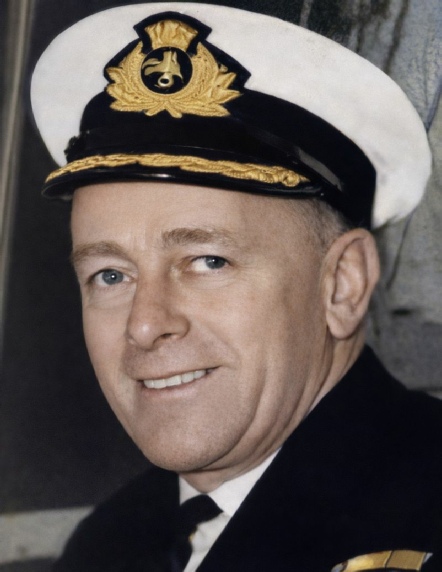“What’s that son? Say that again!”, Swiv would shout the veins at his temples standing out. He was not noted for his good temper.
A side to Captain Lloyd few saw was his loyalty to his officers and crew. A day out of Aden the ‘Tantallon Castle’s cook went mad with the D.T’s and we called for medical assistance, at dawn H.M.S. ‘Glory’ a light fleet aircraft carrier appeared on the horizon and with painful slowness sent on the lamp ‘whaaaat shiiiiip issss thaaaat’?
“Give me the lamp son”, ‘Swiv’ rattled off at tremendous speed our ship’s name. We could read the ‘Glory’ signalman’s mind, back at alarming speed came his response. So the dual ran, each time sending at a faster rate, it was the ‘Glory’ who threw the towel in with ‘please repeat’.
In due course a pinnace came alongside with a doctor, his assistant, a couple of ratings and a chief petty officer – one of the old school. Meeting them at the rail the petty officer and I took the lead to the bridge, half way along the working alleyway the petty officer turned to me and said “Cor, blimy what’s wrong with this ship”?
“Didn’t take you long to spot it Chief”, I replied. The paintwork gleamed, every brass port hole shone, every vent had its tank in highly polished brass, the deck was so clean you could have had your lunch off it. Reaching the bridge ‘Swiv’ glared at one of the ratings, a signalman. “Don’t need you son”, said he, “my cadets do all the signalling on this ship”! Said without a hint of embarrassment.
Twice a week we had to endure ‘rounds’, with most master’s a chore on Wednesday and Saturday mornings to be got through as quickly as possible, Captain Lloyd took his rounds very seriously. Wearing white gloves he would enter the cadets accommodation, running a finger over every surface including deckhead beams (no fancy panelling in those days, bare steelwork was the order of the day) and woe betide us if his glove came away grubby. It meant we would be scrubbing out the accommodation again but in our own time.
Some years later we met up again, this time when I was posted to the ‘Durban Castle’ as fourth officer. The fourth mates job on the Intermediates was deservedly reputed to be the hardest in the Company, in theory the mate was in charge of cargo operations, once more Mr. Todd but in practice it was the poor old fourth who did the lot. The ‘Durban’ sailed from London, called at Marseilles before heading south for Cape Town and all ports to Mombasa, at each port loading and discharging cargo of every commodity you could think of. Each consignment had its own ‘mates receipt’ and ‘bill of lading’, in theory there was a cargo plan – in theory because it was almost entirely in the fourth mates head. The ship would sail from port, cargo figures for stability had to be calculated, figures for discharge at the next port given. The following morning we would dock at the next port and it all started all over again, by the time we sailed from Mombasa I was exhausted.
Captain Lloyd and Mr. Todd were in conversation on the boat deck, “Ah son” said Lloyd “how many packages do we have on board, I need the figure for the Suez Canal declaration form?”
I stared at him aghast, I simply hadn’t the foggiest idea and told them so. ‘Swiv’ Lloyd almost exploded, “What do you mean son ‘you don’t know’, that’s your job on board!” For some six or so weeks I had been getting up at the crack of dawn, often working through until ten at night, running up and down holds checking that the cargo was being stowed correctly, making discharge plans, trying desperately to hold everything together – I saw red. Without a word I turned on my heel and, going to my small cabin scooped up a random bundle of mates receipts and cargo plans and marched into Captain Lloyd’s cabin. Slamming my armful onto his desk I shouted, “There, you want to do the bloody cargo, well do it” and stormed out.
Oh deary me, back in my cabin I wilted, I sat for some time mulling over my options for a future career, clearly my employment by the Union-Castle Line was terminated as of ten minutes ago. Well, if you are going to be sacked better to get cleaned up and look smart, I showered and put on clean whites and waited for the summons I knew would come.
I must have waited for a full hour or so, then came the knock on my door, the Captain’s tiger announced that I was required in the Captain’s cabin. Ushered in I was flabbergasted, there on the coffee table was laid out tea for two, sandwiches and tabnabs (cakes), “Sit down son”. The captain asked me just how long I worked each day, how much assistance I got from the other officers, I replied truthfully that sometimes I didn’t get to bed and I received no help whatsoever. Later when I knew ‘Swiv’ even better I realised that whilst I had been sitting miserably in my cabin he had been interrogating the other officers as to just what they had been doing, probably including Mr. Todd. As we finished tea the Captain said “Well son, the third and second officers will look after discharge in Genoa, all I want you to do is to make sure they know what is going on, from now on you are to have the time off.”
As Junior Second of the ‘Transvaal Castle’ I was again to see the thoroughness of Lloyd’s inquiries before allotting blame and punishment, in all he was an exceptionally fair man. Which made his demotion from passenger vessels all the more unfair.
He was Master of the ‘Durban Castle’ when one of the greasers collapsed in the engine room from heat exhaustion. Lloyd arrived in the engineers alleyway having followed the doctor from the saloon just in time to see the doctor giving the prone man a boot saying, “There’s nothing wrong with him!”
Without any hesitation Captain Lloyd gave the doctor a double DR, the ultimate sanction in his discharge book being ‘decline to report’ for both conduct and ability. The British Medical Association went ballistic, what right had the Master to question the doctor’s ability! Their punishment, that no British doctor would ever sail with Lloyd again, he was put back to cargo ships.
This injustice was righted almost by accident, On the South African coast the master of one of the mail ships had to be taken ashore, the only ship in port was the ‘Tantallon Castle’ with Captain Lloyd. It so happened that the doctor on the mail ship was South African, from that time the Company always made sure that Captain Lloyd’s ship had a South African doctor.
Captain Norman Lloyd held the distinction of being the only South African ‘Bothy’ boy to reach command in the Company, it was this that drove ‘Swiv’, he was determined that he would be the best. If he was not then he was not far short of it.
Known in the Company as ‘Swiv’ Lloyd due to the cast he had in one eye, whilst it did not affect his eyesight it was somewhat disconcerting when speaking to him, you were never sure which way he was looking! Norman Lloyd did pre-sea training in 1925/26 at SATS General Botha in Simon’s Bay before joining the Union-Castle Line.
I first sailed with ‘Swiv’ Lloyd when cadet on the ‘Tantallon Castle’, there were six of us and we should have been warned – not one of the previous voyage’s cadets had returned! The Chief Officer was Mr. Todd, a short stocky very tough man who would rather have been the bosun than the Mate, it was reputed that Lloyd and Todd disliked each other. This may well have been true, on at least one occasion I recall being given conflicting orders from each and receiving a good dressing down from each for not doing as instructed! If indeed it was a fact then Lloyd also knew the truth that a master’s reputation can hang or fall on his chief officer’s ability, Mr. Todd may have given the cadets one hell of a life on deck but he was a good chief officer.
‘Swiv’ Lloyd was the only master I knew to take an interest in both the cadets welfare and education. At suitable ports he would instruct the agent to lay on a taxi to take us sightseeing and each evening at sea after super the six of us had to report to his cabin for seamanship, signalling and ‘rule of the road’ lessons. Each had a length of rope, we were required to be able to tie every knot behind our backs, signalling practice both with flags and the Aldis lamp was an ordeal.

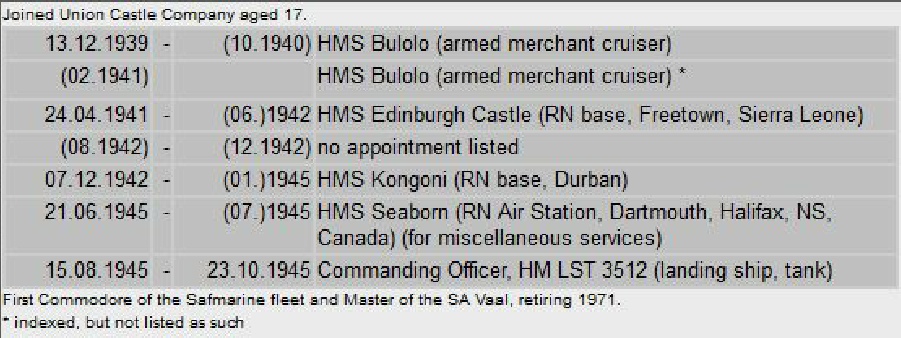
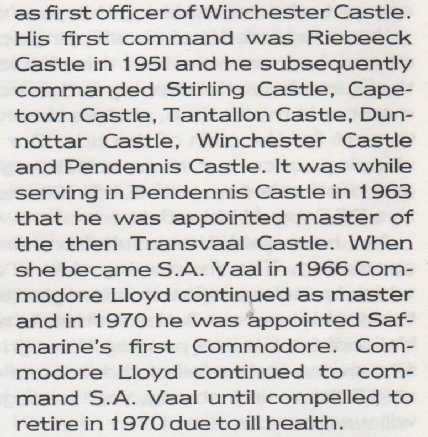

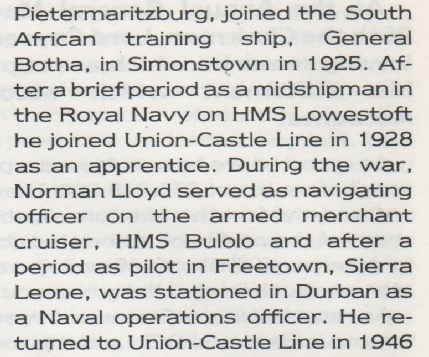
Royal Navy Service 1932 - 1961
Memories of Capt Lloyd from a Senior Engineer
From J H Davies 7/2020
This was my 2nd time on the S.A.Vaal, 3 trips as Ex.Second Engineer and then as Senior Second, first one with Captain R. Wright as master and then Captain Lloyd as master.
My first trip as S/2/E went pretty smoothly with Captain R. Wright as master.
Next trip went off uneventful, sailing from Southampton, with the first port of call was Las Palmas.
But a couple of days before we got to the Cape Jimmy Gauld, the First Engineer, and in my eyes amongst the best sea going marine engineer I had met, said to me “whilst sailing into Cape Town and on the South African coast be your own man”. I thought what he said was rather strange so I asked him to explain, all he would say was “be your own Man”
On arriving off the Cape coast, down on watch at 0400hrs on the manoeuvring platform expecting a call from the bridge to give the engine room the normal 2 hours’ notice to prepare for standby to enter Cape Town. Standing Union-Castle orders were to give the engine room that notice so that the boiler superheated steam production and particularly its temperature could be slowly reduced so the steam flow from the boilers to the turbines could be better controlled.
But instead the phone call was “good morning Second, Captain is on the bridge”, so I replied by saying “good Morning Captain” Then the disagreement commenced, he said, “We have arrived early off Cape Town so I will be ringing Stand By very shortly” my answer was “you may well ring standby but I will not answer it as you and I are aware that you must give the engine room a minimum of 2 hours’ notice before Standby to prepare the engines for manoeuvring”
Of course he did not agree and as master he would decide when standby will be not me, after many words amongst me telling him I will not answer the telegraph under any circumstances until the 2 hour period pre standby was complete and if necessary he could contact the Chief Engineer, in the end he told me that the vessel was close to Cape Town so my parting words with him that morning was there was a great big ocean south of the Cape where the ship could sail for the next couple of hours.
At 0600hrs the telegraph rang standby which was immediately answered and the ship quietly entered Cape Town harbour and tied up alongside, telegraph rang Finished with Engines.
I told Jimmy Gauld what had happened and he just smiled.
Up top, changed, showered and dressed for breakfast, left my cabin and entered the lift to transport me to the dining room and in the lift was Captain Lloyd, I said good morning to him but received no reply.
Next port was Port Elizabeth, and this time given the standard 2 hours’ notice.
Next port was East London, 2 hours’ notice was given and Standby was rung and then the telephone rang, I answered and it was Captain Lloyd and he told me that there was a heavy sea running and may find it difficult to enter the harbour unless he could rely on the engines giving him an extra burst of speed when Double ring ahead came on the telegraph, I told him he could rely on us.
I prepared the staff to ensure we could give him what he required, telegraph rang double ring ahead, and into the harbour we sailed, tied up and telegraph rang finished with engines.
Up top, changed, showered and dressed for breakfast, left my cabin and into the lift and in the lift was Captain Lloyd, I of course said good morning and he smiled and said well-done second we did a good job, I have never missed a port on the coast and was not going to this time but I was rather concerned about the tide, but when it was right and with the extra speed at the right time into the harbour the ship came.
After that we never had a cross word and he was always very pleasant in my company.
Later I asked Jimmy Gauld again what he meant about being my own man, he said in his opinion if I had not stood up to him he would have given me a difficult time, but he knew you had character and could depend on you when required.
Tuesday 16/07/2020
|
Service Record
|
From
|
To
|
|
Joined Company
Cadet
|
1928
|
|
|
Dunnottar Castle
Ex 2nd Officer
|
1938
|
|
|
Royal Navy
|
1941
|
1946
|
|
Winchester Castle
First Officer
|
1946
|
|
|
Stirling Castle
Chief Officer
|
1949
|
|
|
Capetown Castle
Chief Officer
|
|
1951
|
|
Riebeeck Castle
Master
|
1951
|
|
|
Rustenburg Castle
Master
|
12/1952
|
10/1953
|
|
Tantallon Castle
Master
|
7/1956
|
3/1957
|
|
Dunnottar Castle
Master
|
4/1957
|
10/1957
|
|
Riebeeck Castle
Master
|
3/1958
|
9/1958
|
|
Drakensberg Castle
Master
|
2/1959
|
4/1959
|
|
Durban Castle
Master
|
8/1959
|
6/1960
|
|
Winchester Castle
Master
|
8/1960
|
10/1960
|
|
Stirling Castle
Master
|
12/1960
|
12/1961
|
|
Capetown Castle
Master
|
1/1962
|
6/1962
|
|
Pendennis Castle
Master
|
7/1962
|
12/1962
|
|
Transvaal Castle
Master
|
12/1962
|
1/1966
|
|
S A Vaal
Master / Commodore
|
1/1966
|
6/1970
|
|
Retired
|
1970
|
|
|
Died
|
18 April 1986
|
Aged 74
|
Memories of Capt Lloyd from Owen Keen
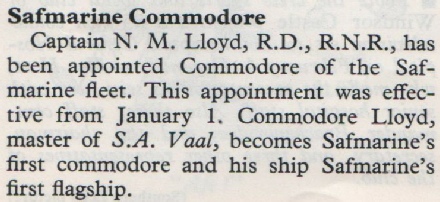
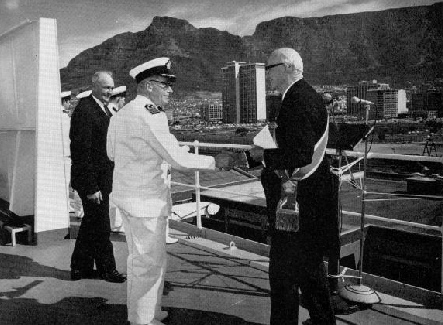
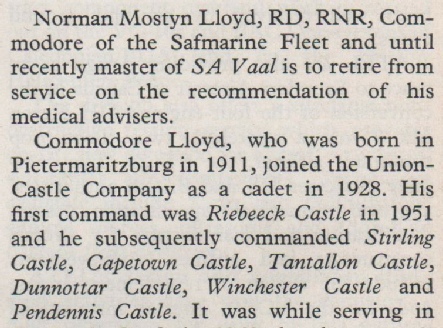
Transvaal Castle - Ship’s Lifeboats
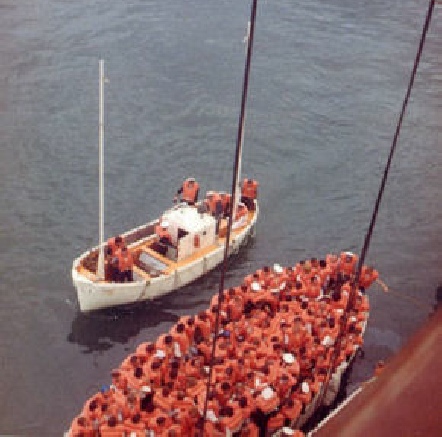
Captain Lloyd was highly critical of the ‘Transvaal Castle’s lifeboats, in theory able to, and certified for very many more people than practically they were able to carry.
To demonstrate this at boat drill either in Durban or East London he would regularly fill one of the boats to capacity .
When full he would, over the public address system, invite the passengers to see for themselves the ludicrous situation, standing room only.
It says much of this man that he was prepared to risk the Company’s anger for something he felt deeply about, perhaps it says much of the Company that they never stopped him from doing it!
Elevation to Commodore of Safmarine - 1970
Retired - 1970
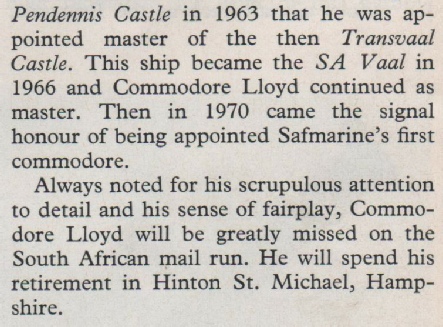
Obituary - 1986
Cmdre Norman Lloyd RD RNR
“Swiv” or “Ushant”
Safmarine 1970


